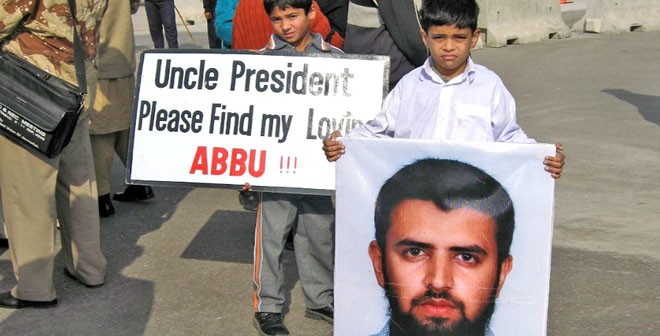

President of Pakistan, Mamnoon Hussain, promulgated the Protection of Pakistan (amended) Ordinance 2014 on January 23. One of the reasons being cited for introducing this legislation was to give legal cover to security and intelligence agencies suspected of keeping the accused terrorists under unannounced detention.
During the hearing of the case of 35 missing persons, Attorney General of Pakistan, Salman Butt, informed the Supreme Court that the federal government had promulgated the Ordinance on enforced disappearances in compliance with the court’s December 10, 2013, judgment in missing persons’ case.
The apex court had declared illegal all prolonged and unannounced detentions by security forces and intelligence agencies, calling for legislation on the issue.
Advocate of the Supreme Court, Tariq Asad, who has been representing several missing persons in different courts, laments the Ordinance’s lack of relevance to the missing persons. "Unfortunately, the Ordinance protects only those who abduct people. It has made ‘their’ job even easier to keep people in detention for longer periods. I am sure the Ordinance has been drafted in consultation with the security forces and intelligence agencies," he says, adding, "It seems it has been promulgated to bail ‘them’ out in the missing persons’ case."
Asad says the Ordinance covers all cases of missing persons during the last several years. To him, it is a copy of the Rowlatt Act, (which was passed by the Imperial Legislative Council in London in 1919, indefinitely extending "emergency measures" enacted during the First World War in order to control public unrest in India).
A senior security official, who does not want to be named, holds a contrary view. He believes such laws are the need of the hour. "It was a long demand of the security forces to have legal cover over their activities. Over the years, we had arrested hundreds of people but most of them were released by the courts due to the lack of evidence. Many of them rejoined militants," he says. "Since weak anti-terror laws are being cited as reasons for it, this should have been done four or five years ago."
An official of the law ministry, who wants to remain anonymous, says it was an old demand of the military and intelligence agencies. "We have worked closely with them during the last few years to make amendments in anti-terrorism laws. This Ordinance is also a part of that. The Ordinance only gives suggestions and the final authority rests with the civilian government to give it a final shape," he says.
"This law is not the first of its kind," says another security official. "In June 2011, President Asif Zardari also promulgated The Actions (in Aid of Civil Power) Regulation, 2011 to give legal cover to the arrest of hundreds of suspected terrorists in federally administered tribal areas and provincial tribal areas in KPK."
The official says legal experts of the Judge Advocate General (JAG) branch in GHQ always give their suggestions and feedback to relevant officials in law ministry and office of the Attorney General of Pakistan on the issue of missing persons. "There is no harm if security forces are involved with the ministry of law and other concerned departments at some level to amend anti-terrorism laws according to present day needs," he believes.
Senior journalist and security analyst Hasan Khan says intelligence agencies have long been asking the government to legalise their activities. "The missing persons’ case resulted in creating a lot of frustration among officials of intelligence agencies. In Balochistan, they left their work in several districts, especially against jihadi and sectarian outfits. The JAG branch was definitely involved in drafting the Protection of Pakistan Ordinance," he says.
"They want even more severe laws. They had asked the government to empower them so that they can keep suspect terrorists for indefinite periods but the government kept it to 90 days," he says.
A senior police official, who does not want to be identified, believes civil and military bureaucracy has drafted the Protection of Pakistan Ordinance 2014. "This government has done something for the military which Musharraf could not do during his tenure. You need to see this Ordinance with other legislations, like the Fair Trial Act, amendments in Anti-Terrorism Act, and many others."
The official says, "These laws have empowered the military to carry out raids, and to arrest and investigate suspects of terrorism. The military has also been involved in the counter terrorism departments in Punjab and Sindh."
He says this Ordinance is not only a technical move to preempt the production of missing persons in the courts but also to protect military and intelligence agencies in the future. "The military does not want to be answerable to the courts, so they have made them answerable only to ‘special courts’ in this Ordinance. You read this piece of law and you would easily understand who is behind the promulgation of this law," he says.
Raja Muhammad Irshad Kiyani, senior advocate, representing security agencies in missing persons’ case in the court, believes the agencies were seriously handicapped in dealing with terrorism under the legal regime which did not incorporate military’s point of view to tackle terrorists. "We are in a war-like situation and we need special laws. We cannot undermine and ridicule our security forces in the name of laws. I had suggested to my client to hire a very powerful legal team to get maximum results out of this Ordinance."